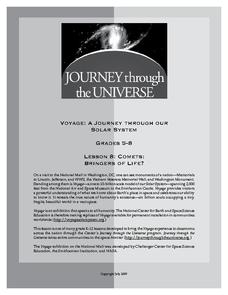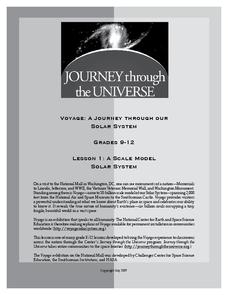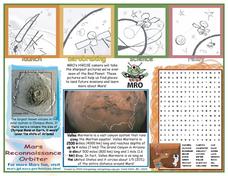Journey Through the Universe
Comets: Bringers of Life?
Young scientists investigate the elements found in our solar system and then construct a model of a comet. They apply their new knowledge to the formation of the solar system.
NASA
Packing for a L-o-o-o-ng Trip to Mars
Pack just enough to fit. Crews determine what personal items to take with them on a trip to Mars. Each team must decide what to take with them on a two-and-a-half year trip to Mars and whether their items will fit within the allotted...
Journey Through the Universe
A Scale Model Solar System
Between the time scientists discovered Pluto and reclassified it as a dwarf planet, it did not even make one full revolution around the sun. In two activities, scholars investigate scale models and their properties. Pupils find that it...
Messenger Education
Look But Don’t Touch—Exploration with Remote Sensing
Mars is home to the tallest mountain in our solar system, Olympus Mons. In this set of two activities, learners review geologic land formations through the analysis of aerial maps. They then apply this knowledge to aerial maps of objects...
Laboratory for Atmospheric and Space Physics
The Planets and Scale
Scholars gain an insight into the relative size of planets and distance between inner and outer planets with the help of informational text, a data table, and a series of four questions.
Messenger Education
Exploring Solar Systems Across the Universe
Scientists have theorized that our solar system formed 4.6 billion years ago. In this pair of activities, learners first hypothesize how our solar system was formed. Using this information, groups then determine how scientists search for...
Curated OER
The Origin of Life
In this origin of life worksheet, learners write answers to five questions. They describe characteristics of the first life forms and how scientists believe oxygen accumulated in the Earth's atmosphere.
Curated OER
Flip Books!
These aren't exactly worksheets, but rather a selection of pdf files of different atmospheric or solar events. Print your chosen pdf file for each aspiring astronomer in your class, have them cut out the individual mini pages, arrange...
Curated OER
Mars Reconnaissance Orbiter Fact Sheet
In this space worksheet, students will read facts about Mars and the Mars Reconnaissance Orbiter. Students will also find 24 space related words in a word search.
Curated OER
Break the Code: Astronomy
Here is a quick puzzle-style worksheet for your aspiring astronomers. A code is printed at the top of the page and learners use it to fill in the blanks describing different phenomena or objects in outer space. The material does not even...
Curated OER
Galaxies and the Universe
If Earth was formed 4600 million years ago, and the sun revolves about the center of the Milky Way once every 250 million years, how many revolutions have occurred? Students answer this question and ten more, all providing students with...
Curated OER
Moon Shadows
In this moon shadows instructional activity, 3rd graders follow the directions to set up a demonstration about the sun, the earth and the moon.
Curated OER
The Inner Planets
In this planets worksheet, high schoolers review the characteristics of the inner planets: Mars, Venus, Earth, and Mercury. This worksheet has 15 multiple choice questions.
Curated OER
Alternate Tide of Change Worksheet
In this space science worksheet, students look up the mass of the sun and moon. They graph the results with the graphic organizer and answer the questions that are related.
Curated OER
The Moon
In this space science activity, students complete each of the statements with the correct word or phrase about the moon. Then they identify four ways that scientists believe the moon was formed, selecting one and writing a paragraph...
Curated OER
The Sun
In this space science worksheet, students identify and name which gases make up the sun and the name of the part of the sun that we can see from Earth. Then they describe a solar eclipse and draw a diagram illustrating what happens...
Curated OER
Scavenger Hunt: Who am I?
In this space science worksheet, students use the sites listed on the Solar System and Planets page of the Kid Zone to locate the names of the people credited with each discovery. They identify and name 26 different scientists who made...
Curated OER
Solar System
In this space science activity, students complete each statement with the correct word or phrase related to the solar system. Then they locate each of the planets in a word search that follows.
Curated OER
Exploration of the Moon
In this moon worksheet, students will use a table with facts about the moon to answer questions about the moon's rotation, distance from the Earth, gravity, and temperature. Students will complete 9 short answer questions.
Curated OER
The Effects of Storms
An excellent way to review a chapter or unit on storms, this worksheet features vocabulary review (gust, evacuation, storm surge, salinity), concept review (effects and details about hurricanes), skills/process review (normal high tide...
Curated OER
What is Momentum?
In this momentum learning exercise, students will calculate the maximum forward momentum of the Apollo 11 lunar spacecraft at three different stages of its space travel.
Curated OER
Mars Pathfinder
In this science worksheet, learners read about the Mars Pathfinder. Students also answer 2 comprehension questions about the reading.
Curated OER
How Do Things Move
In this science instructional activity, students identify the Newton laws that explains what happens in 6 steps. The steps involve a yo-yo that is suspended from a hook on a ceiling.
Curated OER
Contour Map Worksheet #4
There are only four questions here. There is a contour map of Cottonwood, Colorado and the creek that crosses it. Earth scientists tell in what direction the creek flows, identify the highest elevation on the map, draw a topographic...























